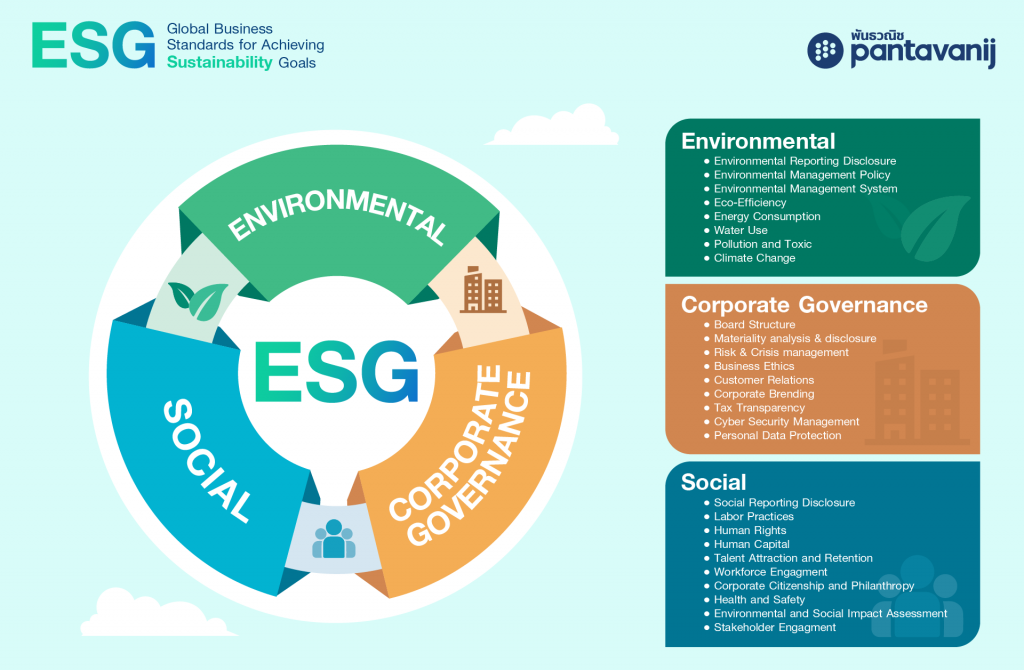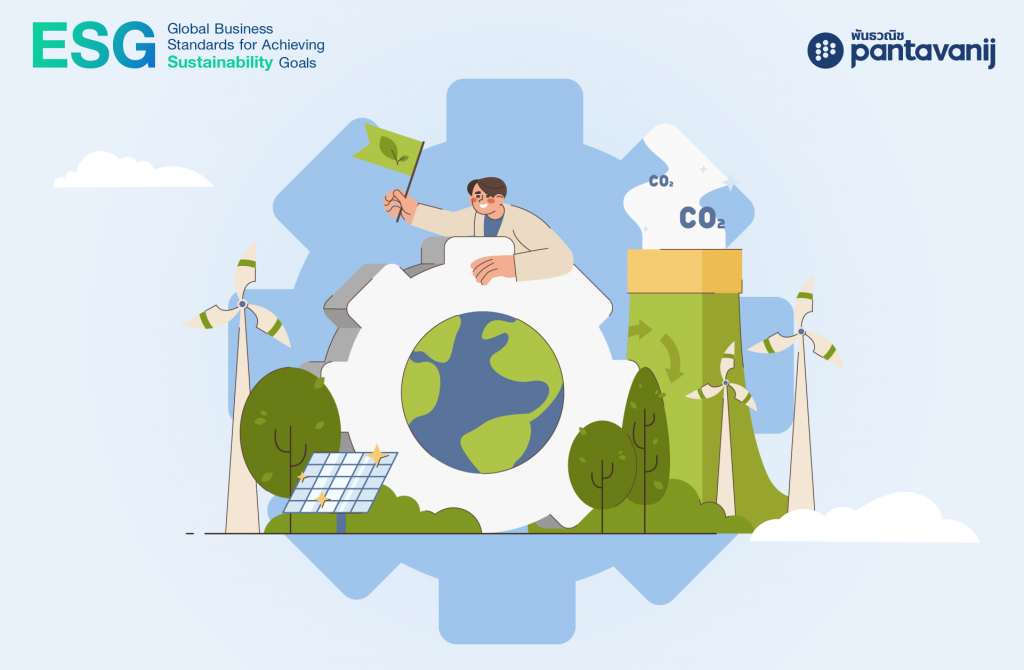From Challenges to a Core Strategy for Business Stability
How will conducting business based on sustainability principles, or ESG (Environment, Social, and Governance), impact buyers, sellers, or transform procurement practices?

The Importance of ESG
The impact of global changes in various areas, including natural disasters, illegal and unethical labor practices, and the lack of ethical business conduct, as well as unrest in conflict zones, pandemics, or even issues of inequality resulting from technological advancements.
These factors have created unprecedented awareness of sustainability goals across all sectors. It is a challenge for businesses to demonstrate responsibility and showcase their management capabilities to reduce pressure from customers and consumers, as well as to mitigate income impacts and maintain business stability amidst instability.
ESG in Procurement

Challenges
Sustainability has become a core business objective for leading companies, making the roles of procurement departments on the buyer side and sales departments on the seller/supplier side increasingly important. They are crucial in sustaining the ecosystem and ensuring that organizational sustainability policies are implemented smoothly. This shift presents challenges and accelerates the need for adaptation across various dimensions.
-
Supplier Sourcing for Buyers and Seller Participation in Bidding
Changes in operations or new ESG-related activities within various departments of the organization have necessitated procurement teams to source new suppliers with whom they have not previously done business and who are not listed in the current database. This includes understanding the services, materials, equipment, and business profiles of suppliers that meet the department’s needs and operate according to sustainability principles. For example, this might involve finding suppliers that offer consultancy for social activities related to wastewater treatment, suppliers producing raw materials for new environmentally-friendly products, or suppliers providing pollution-free services.
On the seller/supplier side, there is a challenge in reviewing, updating, and improving basic information and business profiles to ensure they are current and complete according to the buyer’s requirements. This also includes fulfilling additional information requests from electronic procurement systems, as this data is crucial and represents the new standards that buyers use to evaluate suppliers.
Especially for procurement through electronic systems or platforms that rely on data to drive all processes, the completeness and accuracy of the seller’s company information are crucial. This ensures that the seller appears in channels that buyers use daily and benefits from artificial intelligence in managing and storing seller data in a central repository that provides information to buyers.
Similarly, product/service presentations and sales promotions are also affected by the need to adapt. This includes adapting to new presentation channels demanded by buyers, which the seller may not have used before.
The criteria for designing communication must align with and reflect ESG principles, including the demands for credibility in new sellers that buyers require before starting business engagements. The complexity and diversity of these requirements may challenge sellers in adapting quickly or may require more time to achieve compliance.
-
Supply Chain Review
The rapid adaptation of procurement teams on the buyer’s side and sales teams on the seller’s side to meet sustainability goals poses a risk of supply chain disruptions. This can occur when smaller companies are unable to develop or lack the capacity to prepare adequately to qualify as partners under the buyer’s sustainable procurement policies. For example, this includes the use of technology to replace employees, new forms of remote communication, or the level of modern technology used for collaborative work.
-
Building Equality
Creating equality and supporting local suppliers poses challenges in achieving social goals, especially for sellers who must build buyer confidence in engaging with new partners. This includes improving and developing processes, both policies and technology, to increase opportunities for local suppliers to participate in bidding with standardized competitive criteria. These criteria should enable the demonstration, specification, tracking, verification, and prevention of issues to ensure transparency.
-
Recruiting Experts
Operating in accordance with ESG principles has increased the demand for environmental experts and software specialists for management roles. These experts are appointed as overseers of the organization’s sustainability efforts, particularly to decentralize decision-making and improve policies swiftly. They also play a crucial role in leading communication and training within the organization. As a result, experts who are both knowledgeable and adaptable are becoming increasingly sought after.
-
Roles and Knowledge
Organizational sustainability goals have widespread impacts across various departments, creating pressure and expectations for the procurement function to demonstrate its capabilities and understanding of ESG principles. This is because sustainability can affect revenue, costs, and organizational stability, as well as reputation, image, and the maintenance of service quality to meet customer satisfaction.
What should buyers, sellers, and procurement departments do to achieve sustainability goals?

Buyer’s Partner Review
A key risk that could prevent buyers from achieving their sustainability goals is the neglect to regularly review existing partners using current frameworks and criteria. This review should assess the partners’ qualifications, capabilities, and sustainability policies, in order to mitigate and reduce risks associated with engaging in business with partners who do not meet standards or who act contrary to ESG principles, or even engage in corruption and illegal activities. Such risks can negatively impact reputation, result in substantial fines, affect product quality before delivery to customers, and lead to consumer demands for public disclosure of sustainability policies to demonstrate transparency.
How Sellers/Suppliers Can Become ESG-Certified Partners
ESG certification can have an immediate impact on a seller’s or supplier’s revenue and sales. This is because buyer requirements and regulations are often designed to mandate business dealings exclusively with ESG-certified partners. Consequently, some buyers may expedite their own assessments of their partners without giving sufficient advance notice. As a result, partners may not be adequately prepared or able to promptly evaluate their operations, leading to failure in obtaining certification. This situation can cause lost sales opportunities and damage existing relationships with those buyers.
On the side of partners conducting their own qualification assessments, there may be issues with completeness and coverage in the areas being evaluated. This is because ESG encompasses 17 principles that reflect various dimensions, including social, environmental, economic, and governance aspects, as well as peace and institutions and development partnerships, or the Sustainable Development Goals (SDGs).
Additionally, the buyer’s ESG policy framework may also include financial security or criminal-related concerns, among others. Therefore, it is necessary to rely on specialized agencies with expertise to ensure proper certification.
Achieving sustainability goals helps sellers increase sales opportunities and expand their business, and positions them as recognized partners among leading buyers for operating transparently and responsibly in society.
ESG in Pantavanij’s Services
The company is always mindful of sustainable procurement and responsibility across all sectors of the supply chain.
In accordance with sustainable procurement measures or ESG, which are becoming key standards in today’s business world, we offer qualification and business assessment services under the name ‘Supplier 360’.
Our goal is to develop sellers on the system to enhance their potential and integrate them sustainably into the ecosystem. This helps buyer organizations to explore, assess, and select capable partners, while also preventing and reducing risks associated with negative impacts from business engagements.
Learn more about Supplier 360, clickContact Supplier 360 Department
Tel. 02-034-4466
Email:supplier360@pantavanij.com


 TH
TH